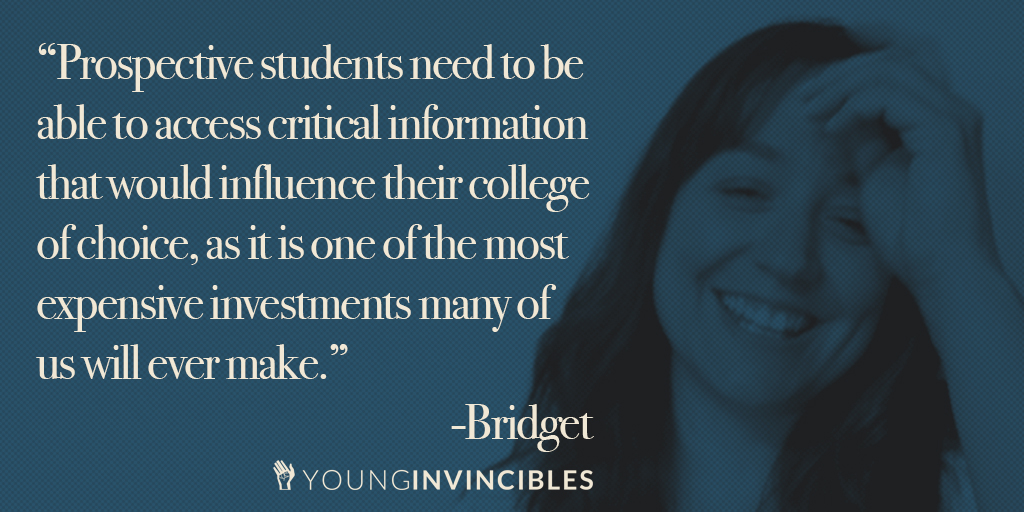A certain image of the struggling Millennial shows up often in the media – underemployed, underpaid, and swimming in debt. I am that Millennial. I am buried in more than $113,000 of student loan debt, and can barely stay afloat financially. And there are thousands of people grappling with similar stories. These numbers – these people – can’t be linked to the common misrepresentation of Millennials – that we’re lazy, entitled, and misguided. There’s a much larger network of institutional barriers at work here. One of these barriers is accountability of our higher educational institutions. Prospective students should be able to access critical information that would influence their college of choice, as it is one of the most expensive investments many of us will ever make.
I graduated from the University of Pittsburgh in 2007 with bachelor’s degrees in Anthropology and Sociology, and a certificate in Women’s Studies, just as the economy was beginning to stagnate. I loved my time at Pitt. I honed my analytical skills, expanded my understanding of worldviews, and learned the value of a liberal arts education. It was just the college experience I had been promised, and it was so personally enriching. But that experience doesn’t seem to translate that easily for hiring managers.
I thought having three degrees would have made me more well-rounded and appealing to potential employers, as it demonstrated my analytical skills and work ethic. At least that’s what I was led to believe when I was provided with a list of careers paths for sociologists and anthropologists and the variety of ways in which we could leverage our degrees. These lists made the job market out to be brimming with opportunities, all without releasing a single statistic from my school on how many students in my program actually found work in their field. I spent the summer after graduating looking for a job, and when I couldn’t find anything in my field, I eventually settled for a minimum wage job at my local Starbucks.
My mistake, I thought, was my lack of specialization, so I signed the papers, pursued the shiny program brochures and enrolled myself in a masters in interior design program at Chatham University, believing that it would lead to a good job.
Interior design has always been a hobby and secondary interest of mine, and those around me echoed the idea that pursuing a more focused degree would lead to a more stable job and a good living. Perhaps unsurprisingly, when I graduated in the fall of 2009, I was still without a job. We were in the throes of the worst recession since the Great Depression, the housing market had collapsed, and finding a job was that much harder as a young person. I’ve spent the years since initially working three part-time jobs, and moving into a full-time position stagnating at around $30,000 a year. Finally, after going a year and a half without a raise and working 40 hours a week, I got a second part-time job.
Looking back at my education, I can’t help but feel mislead and cheated. While I’ll never regret my undergraduate liberal arts degrees, I pursued my graduate education without realizing how important your choice of school and program is when planning for and pursuing a career. It isn’t as if I never did my homework, there just isn’t enough information available for research. I may have been able to know how many students graduated from my school in my programs, and how many of them found work in their field, or found work at all a year after graduation. But right now, our government nor our schools make any of that information available. These details would have heavily influenced which school I attended, what programs I selected, and how much debt I’d be willing to accumulate for my education. But the blame instead has to fall on my shoulders, and schools continue to share none of the accountability.
Since graduation, I’ve been continuously solicited for donations with these requests following me through moves and relocation, but have not found equal efforts to give students resources on finding work in their field.
Transparency and accountability provided through higher education data would arm students with information to help them make the informed decision that I could not. Further, colleges should be, in part, accountable for the placement of their students post-graduation and accountable at holding their degrees to the esteem in which they cost. Simply put: if the students are paying a premium for the degree, the institutions should be accountable for delivering a return on investment.
For me, getting a return on investment will be a lifelong battle. I continue to hold onto the hope that those so quick to point fingers and call Millennials names will eventually recognize the need for action. Until then, I’ll continue to work more than 40 hours a week.
Bridget is a more-than-full-time working girl who spends her nights easing her furiously fervent mind by daydreaming about writing op-eds and taking her activism to the next level. In her free time she enjoys volunteering in her community, spending time outdoors and pretending she has a green thumb. She is perilously passionate about Millennials and their fight to reclaim any semblance of the American Dream.

